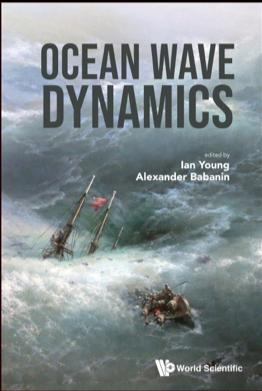Turns out, it’s all in the water

Credit: World Scientific
The design of coastal structures, the safety of offshore shipping, the prediction of extreme weather, coastal flooding, and beach erosion–all depend on our ability to understand and predict ocean waves. Such an understanding requires detailed physical models of how waves interact with the environment, the statistical representation of waves and a capability to obtain global data on ocean waves. Ocean Wave Dynamics covers all these challenging areas in a single publication.
As our understanding of ocean waves increases, we are gradually moving from empirical representations to detailed physical representations. The processes which govern the generation and evolution of ocean waves are extremely complex. Nevertheless, progress in understanding these processes has advanced significantly. This has resulted in a much-enhanced ability to predict waves both at global scale and regionally. Ocean Wave Dynamics outlines in a systematic manner our present understanding of each of these processes and how they result in an enhanced ability to model the complex dynamics of the ocean surface.
Eight of the world’s top researchers from the fields of physics, oceanography, meteorology, mathematics and engineering have come together to present a comprehensive understanding of research in this field. The most significant aspects of the book include: a detailed explanation of the key research topics in ocean wave dynamics, an explanation of the different approaches adopted in predicting ocean wave evolution and an understanding of areas where future research is required. This understanding will underpin the next generation of wave prediction tools and Metocean engineering methods. Such tools will combine our enhanced understanding of the nonlinear physical processes active, with advanced statistical methods and ever increasing computational power to enhance predictions of both extremes and climatology of ocean waves.
Ocean Wave Dynamics is an important reference for a broad range of potential readers, including ocean engineers, oceanographers, atmospheric scientists, computer modelers, and graduate students. The book retails for US$138 / £120 (hardback) and is also available in electronic formats. To order or learn more about the book, visit http://www.
###
About the Editors
Ian Young is Kernot Professor of Engineering at the University of Melbourne. Prior to this appointment he held the administrative roles of Vice-Chancellor of the Australian National University and Vice-Chancellor of Swinburne University of Technology. Prior to joining Swinburne, he was Executive Dean, Faculty of Engineering, Computer & Mathematical Sciences and Pro-Vice-Chancellor (International) at the University of Adelaide. His researcher interests concern wind generated ocean waves. He has an extensive publication record in areas such as the physics of air-sea interaction, the numerical modelling of waves, finite depth waves, satellite remote sensing and ocean wind and wave climate. In recent years, he has conducted a range of studies aimed at understanding global ocean wind and wave climate. These studies use large satellite databases which he has compiled. The studies investigate seasonal wind and wave climate, extremes and long-term trends in wind speed and wave height. He has published extensively in aspects of remote sensing of the oceans with applications to both engineering design and climate. He is author of more than 150 refereed papers and two major research monographs in the field. He is also a consultant to offshore industries in Australia, the United States and Asia, as well as an advisor to the US Navy on ocean wave physics.
Alexander V Babanin is Professor in Ocean Engineering at the University of Melbourne, Australia. Qualifications: BSc (Physics), MSc (Physical Oceanography) (Lomonosov Moscow State University, Russia), PhD (Physical Oceanography) (Marine Hydrophysical Institute, Sebastopol, Russia). He worked as a Research Scientist in the Marine Hydrophysical Institute, as an Academic in the University of New South Wales, ADFA, Canberra, The University of Adelaide, South Australia and Swinburne University of Technology, Melbourne. Areas of expertise, research and teaching are wind-generated waves, maritime and coastal engineering, air-sea interactions, ocean turbulence and ocean dynamics, climate, environmental instrumentation and remote sensing of the ocean. These include extreme Metocean conditions, from tropical cyclones to Arctic and Antarctic environments.
About World Scientific Publishing Co.
World Scientific Publishing is a leading international independent publisher of books and journals for the scholarly, research and professional communities. World Scientific collaborates with prestigious organisations like the Nobel Foundation and US National Academies Press to bring high quality academic and professional content to researchers and academics worldwide. The company publishes about 600 books and over 140 journals in various fields annually. To find out more about World Scientific, please visit http://www.
For more information, contact Amanda at [email protected].
Media Contact
Amanda Yun
[email protected]
Original Source
https:/




